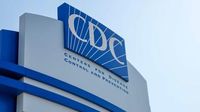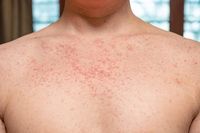As measles outbreaks continue to escalate across the United States and in Australia, public health officials are sounding alarms over the highly contagious disease. The situation is particularly dire in Western Australia, where the number of confirmed measles cases has risen to ten as of March 31, 2025. This alarming increase follows the identification of multiple exposure sites, including the Westfield Carousel Shopping Centre in Cannington and Bunbury Regional Hospital, both of which have been linked to the recent cases.
The latest surge in Western Australia includes five new cases reported over the weekend, three of which were among prisoners, while two were exposed at the hospital. Health authorities are urging residents to remain vigilant and monitor for symptoms, which typically manifest seven to 18 days after exposure. Early symptoms include fever, tiredness, runny nose, cough, and sore red eyes, followed by a distinctive red, blotchy rash that begins on the face and spreads across the body.
Paul Effler, acting director of communicable diseases at WA Health, emphasized the seriousness of the situation, stating, "The unfortunate reality is that measles is incredibly infectious—potentially the most contagious disease known to humanity." He noted that vaccination remains the most effective means of prevention, urging anyone born after 1965 to confirm they have received two doses of the measles vaccine.
As the crisis unfolds in Australia, the U.S. is not immune to the threat of measles. A significant outbreak that began in West Texas in late January has now resulted in 400 confirmed cases in Texas alone, with more than 50 additional cases reported in New Mexico and Oklahoma. Public health experts warn that the actual numbers may be much higher, as exposure sites have been identified in various transportation hubs, including Washington Dulles International Airport and on Amtrak trains.
So far this year, 2025 has seen over 480 measles cases reported across 20 states, a stark increase compared to previous years. In fact, almost all of these cases involve individuals who were unvaccinated. The Centers for Disease Control and Prevention (CDC) has indicated that about 14% of those infected have required hospitalization, a significant decrease from the 40% hospitalization rate observed in the previous year.
Despite the alarming statistics, there is a growing trend among parents toward vaccine enthusiasm. Pediatricians in several states report an uptick in inquiries regarding the measles, mumps, and rubella (MMR) vaccine. Dr. Shannon Fox-Levine from Florida noted that her office has been inundated with calls from parents eager to ensure their children are vaccinated. With kindergarten vaccination rates in Florida dropping to 88.1% during the 2023-2024 school year, this renewed interest in vaccinations is seen as a positive shift.
Dr. Christoph Diasio, a pediatrician in North Carolina, has also noticed an increase in families requesting early vaccinations for their children, particularly those traveling to outbreak areas. The CDC advises that infants as young as six months can receive the MMR vaccine if they are traveling abroad or in an outbreak zone.
However, the CDC's response to the outbreak has been complicated by internal controversies. Recently, agency leaders ordered staff not to release an assessment indicating that the risk of measles is high in areas with low vaccination rates. This decision has raised concerns among public health experts, who argue that transparency is crucial in managing the outbreak effectively.
Jennifer Nuzzo, director of the Pandemic Center at Brown University, expressed her alarm at the CDC's change in messaging. "No vaccine is without risk, but that makes it sound like it’s a very active coin toss of a decision," she remarked, emphasizing the urgency of the current situation.
As the outbreak continues to spread, health officials are also grappling with the implications of the current administration's stance on vaccines. Under Secretary of Health and Human Services Robert F. Kennedy Jr., who has been a vocal critic of vaccines, the CDC's messaging has shifted to emphasize personal choice regarding vaccination. This change has left some public health professionals questioning the agency's commitment to promoting vaccination as the best defense against measles.
As the number of confirmed measles cases in the U.S. rose to 483 this week, the urgency for vaccination has never been clearer. The CDC continues to recommend the MMR vaccine as the most effective way to protect against measles, yet the public's confidence in vaccination programs is being tested amid the ongoing outbreaks.
In conclusion, the current measles outbreaks in both the U.S. and Australia highlight the critical need for vaccination and public health awareness. As communities work to combat these outbreaks, health officials are urging individuals to stay informed, verify their vaccination status, and take necessary precautions to protect themselves and their families.









